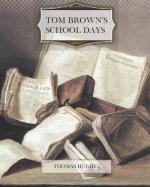From Porter’s they adjourned to Sally Harrowell’s, where they found a lot of School-house boys waiting for the roast potatoes, and relating their own exploits in the day’s match at the top of their voices. The street opened at once into Sally’s kitchen, a low brick-floored room, with large recess for fire, and chimney-corner seats. Poor little Sally, the most good-natured and much-enduring of womankind, was bustling about, with a napkin in her hand, from her own oven to those of the neighbours’ cottages up the yard at the back of the house. Stumps, her husband, a short, easy-going shoemaker, with a beery, humorous eye and ponderous calves, who lived mostly on his wife’s earnings, stood in a corner of the room, exchanging shots of the roughest description of repartee with every boy in turn. “Stumps, you lout, you’ve had too much beer again to-day.” “’Twasn’t of your paying for, then.” “Stumps’s calves are running down into his ankles; they want to get to grass.” “Better be doing that than gone altogether like yours,” etc. Very poor stuff it was, but it served to make time pass; and every now and then Sally arrived in the middle with a smoking tin of potatoes, which was cleared off in a few seconds, each boy as he seized his lot running off to the house with “Put me down two-penn’orth, Sally;” “Put down three-penn’orth between me and Davis,” etc. How she ever kept the accounts so straight as she did, in her head and on her slate, was a perfect wonder.
East and Tom got served at last, and started back for the School-house, just as the locking-up bell began to ring, East on the way recounting the life and adventures of Stumps, who was a character. Amongst his other small avocations, he was the hind carrier of a sedan-chair, the last of its race, in which the Rugby ladies still went out to tea, and in which, when he was fairly harnessed and carrying a load, it was the delight of small and mischievous boys to follow him and whip his calves. This was too much for the temper even of Stumps, and he would pursue his tormentors in a vindictive and apoplectic manner when released, but was easily pacified by twopence to buy beer with.
The lower-school boys of the School-house, some fifteen in number, had tea in the lower-fifth school, and were presided over by the old verger or head-porter. Each boy had a quarter of a loaf of bread and pat of butter, and as much tea as he pleased; and there was scarcely one who didn’t add to this some further luxury, such as baked potatoes, a herring, sprats, or something of the sort. But few at this period of the half-year could live up to a pound of Porter’s sausages, and East was in great magnificence upon the strength of theirs. He had produced a toasting-fork from his study, and set Tom to toast the sausages, while he mounted guard over their butter and potatoes. “’Cause,” as he explained, “you’re a new boy, and they’ll play you some trick and get our butter; but you can toast just as well as




